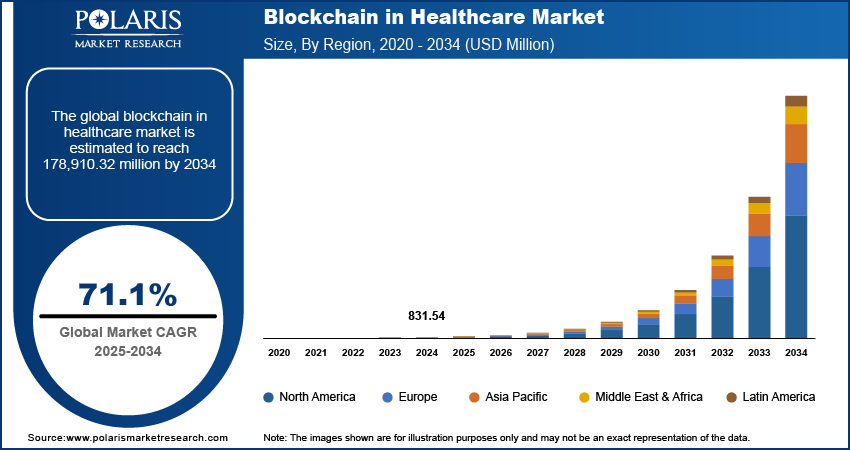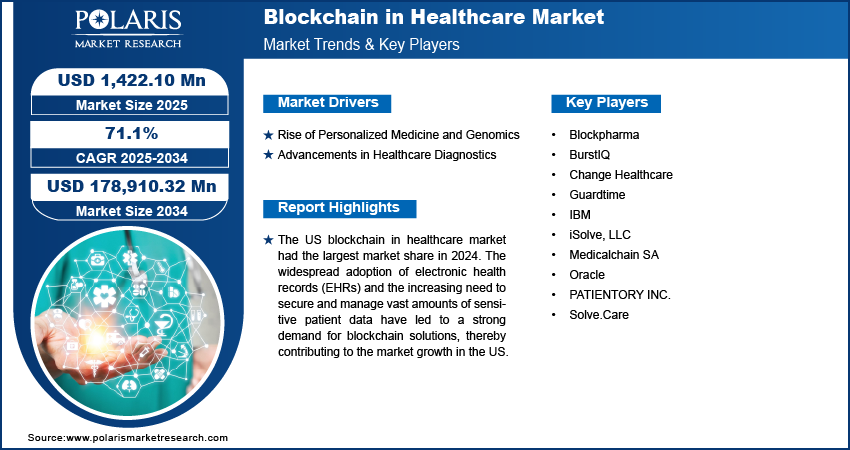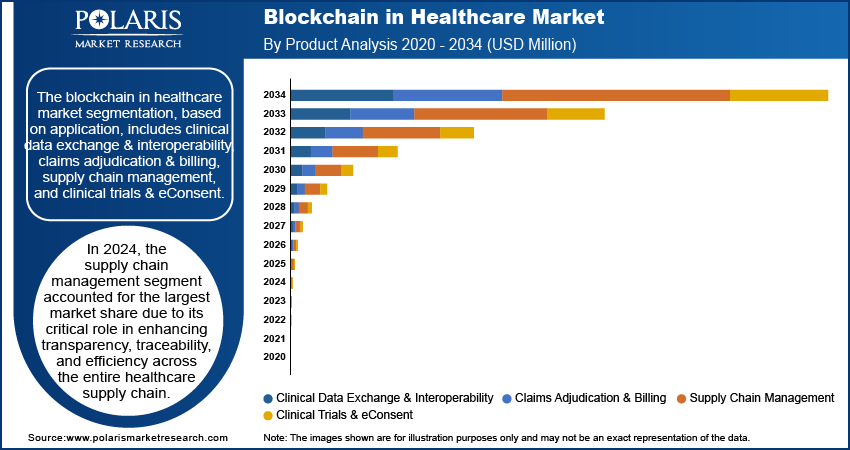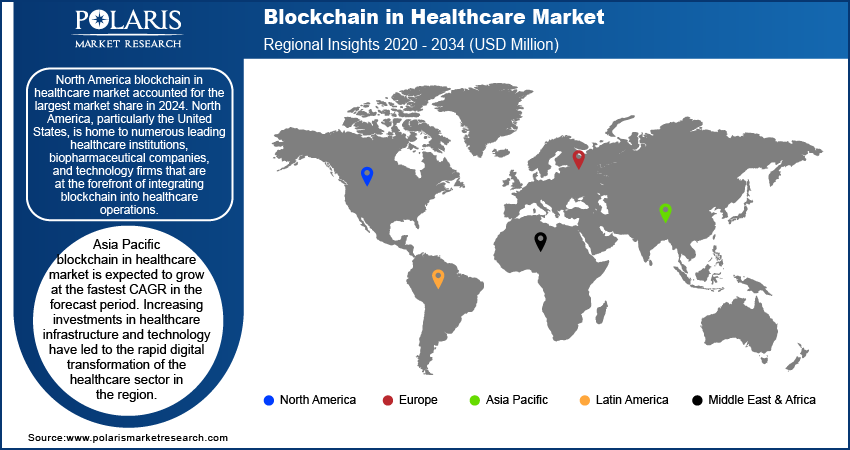
Blockchain in Healthcare Market Size, Share, Trends, Industry Analysis Report
By Application (Clinical Data Exchange & Interoperability, Claims Adjudication & Billing), By Network Type, By End Use, By Region – Market Forecast, 2025–2034
- Published Date:Oct-2025
- Pages: 120
- Format: PDF
- Report ID: PM1374
- Base Year: 2024
- Historical Data: 2020-2023
Market Overview
The blockchain in healthcare market size was valued at USD 831.54 million in 2024 and is projected to register a CAGR of 71.1% from 2025 to 2034. The rise of telemedicine and remote patient monitoring necessitates robust platforms for managing and exchanging patient data securely. Blockchain technology offers the potential for secure data exchange between patients and healthcare providers. Furthermore, governments and regulatory bodies worldwide are acknowledging the potential of blockchain in healthcare. They are actively promoting its adoption through favorable regulatory frameworks, financial support, and pilot initiatives. This concerted effort is significantly propelling blockchain in healthcare market expansion.
Key Insights
- In 2024, the supply chain management segment accounted for the largest share. This is driven by its critical role in enhancing transparency, traceability, and efficiency across the entire healthcare supply chain.
- The biopharmaceutical & medical device companies segment is expected to witness the fastest growth during the forecast period. The dominance is attributed to the surge in surgical and medical instrument manufacturing.
- North America accounted for the largest share in 2024. Regulatory support and favorable government initiatives play a key role in boosting the adoption of blockchain in healthcare across the region.
- The Asia Pacific blockchain in healthcare industry is expected to register the highest CAGR during the forecast period. Increasing investments in healthcare infrastructure and technologies have led to the rapid digital transformation of the healthcare sector in the region.
Industry Dynamics
- The rising preference for personalized medicine and genomics is driving the growth of the market.
- Increasing technological advancements in healthcare diagnostics contribute to the adoption of blockchain in the healthcare industry.
- High implementation costs are hindering the market expansion.
- Growing incidence of data breaches in the healthcare industry is expected to offer opportunities during the forecast period.
Market Statistics
2024 Market Size: USD 831.54 million
2034 Projected Market Size: USD 178,910.32 million
CAGR (2025–2034): 71.1%
North America: Largest market in 2024
AI Impact on Blockchain in Healthcare Market
- Blockchain technology ensures tamper-proof data storage, whereas artificial intelligence (AI) monitors for anomalies and potential breaches in real time.
- AI tools are used to detect ransomware threats, phishing attempts, and unauthorized access faster than traditional systems.
- The technology analyzes vast medical datasets to forecast diseases, improve diagnostics, and personalize treatments. Blockchain technology ensures the integrity of these datasets. This makes AI-driven insights more reliable.
- The integration of AI and blockchain supports secure and accurate electronic health records (EHRs) to enhance care coordination.

To Understand More About this Research: Request a Free Sample Report
The blockchain in healthcare market refers to the use of blockchain technology within the healthcare industry to securely store, manage, and share medical data and records. The surge in sensitive patient data and cyberattacks in healthcare is driving the need for secure data storage and sharing solutions. Blockchain's decentralized and encrypted nature provides high levels of security and privacy, making it attractive for healthcare organizations. Furthermore, with the increasing adoption of electronic health records (EHRs) and digital tools, there is a demand for seamless data sharing across platforms. Blockchain technology facilitates interoperability by offering a standardized, tamper-proof system for exchanging data between healthcare systems, contributing to blockchain in healthcare market growth.
Market Trends
Rise of Personalized Medicine and Genomics
The advancement of personalized medicine and genomics necessitates the secure and effective management of vast volumes of sensitive genetic data. Blockchain technology securely stores and shares genetic information, ensuring patient privacy while enabling researchers and healthcare providers to access the data necessary for personalized treatment plans. For instance, in May 2024, OM1 announced the launch of three new products, OM1 Lyra, OM1 Orion, and OM1 Polaris, to expedite the delivery of personalized medicine. All three products all powered by PhenOMTM, an AI digital phenotyping platform for personalized medicine and clinical research. This surge in the launch of new products and platforms for personalized medicine is driving the demand for blockchain in the healthcare market.
Advancements in Healthcare Diagnostics
Advancements in healthcare diagnostics are playing a pivotal role in driving market growth and revolutionizing disease detection, monitoring, and management. The emergence of advanced diagnostic technologies has markedly enhanced the precision, speed, and accessibility of healthcare services, leading to earlier and more accurate diagnoses critical for effective treatment and improved patient outcomes. Furthermore, the growing integration of AI and blockchain technology is fueling substantial advancements across diverse sectors, notably in healthcare. For instance, ZayaAI, an AI-focused technology company partnered with Enjinstarter, a Web3 Launchpad and advisory firm. This collaboration aims to harness the potential of AI and blockchain technology to drive significant progress in healthcare diagnostics and outcomes, thereby boosting the demand for blockchain in healthcare solutions.

Segment Insights
Market Assesment by Application Outlook
The blockchain in healthcare market segmentation, based on application, includes clinical data exchange & interoperability, claims adjudication & billing, supply chain management, and clinical trials & eConsent. In 2024, the supply chain management segment accounted for the largest market share due to its critical role in enhancing transparency, traceability, and efficiency across the entire healthcare supply chain. The healthcare industry is heavily reliant on the appropriate and accurate delivery of medical supplies, pharmaceuticals, and equipment. However, traditional supply chain systems are often plagued by issues such as fake products, lack of transparency, and inefficiencies in tracking and verifying the movement of goods. Blockchain technology addresses these challenges by providing a decentralized and immutable ledger that allows all stakeholders, including manufacturers, distributors, and healthcare providers, to track products from their origin to their final destination. This real-time visibility helps verify the authenticity of products, reduces the risk of fake drugs, and ensures compliance with regulatory requirements. Additionally, blockchain enhances the efficiency of supply chain operations by automating processes such as inventory management, order processing, and payments, thereby reducing operational costs and minimizing errors.
Market Evaluation by End Use Outlook
The blockchain in healthcare market segmentation, based on end use, includes healthcare providers, healthcare payers, biopharmaceutical & medical device companies, and others. The biopharmaceutical & medical device companies segment is expected to witness the fastest growth due to the surge in surgical and medical instrument manufacturing. For instance, according to the US Department of Commerce, in 2020, surgical and medical instrument manufacturing in the medical devices industry generated the highest sales, at approximately USD 36.3 billion. Additionally, pharmaceutical preparation manufacturing led the biopharmaceutical industry with approximately USD 154.7 billion in revenue. The expansion of this medical devices industry is driving the demand for advanced surgical tools and medical instruments, further creating the need for secure and transparent supply chains. Blockchain technology is well-suited to address these challenges by ensuring the traceability and authenticity of medical devices throughout their lifecycle. As a result, the biopharmaceutical & medical device companies segment is expected to be the fastest-growing market segment from 2025 to 2034.

Regional Insights
By region, the study provides market insights into North America, Europe, Asia Pacific, Latin America, and the Middle East & Africa. North America blockchain in healthcare market accounted for the largest market share in 2024. North America, particularly the United States, is home to numerous leading healthcare institutions, biopharmaceutical companies, and technology firms that are at the forefront of integrating blockchain into healthcare operations. Furthermore, regulatory support and favorable government initiatives also play a significant role in boosting the use of blockchain in healthcare across the region.
The US blockchain in healthcare market had the largest market share in 2024. The widespread adoption of electronic health records (EHRs) and the increasing need to secure and manage vast amounts of sensitive patient data have led to a strong demand for blockchain solutions, thereby contributing to the market growth in the US.
Asia Pacific blockchain in healthcare market is expected to grow at the fastest CAGR in the forecast period. Increasing investments in healthcare infrastructure and technology have led to the rapid digital transformation of the healthcare sector in the region. Additionally, the increasing number of clinical trials in the region has significantly contributed to the adoption of blockchain technology, further driving the blockchain in healthcare market growth. For instance, in March 2024, APAC accounted for 18.1% of Phase IV trials, which is the highest proportion as compared to the other regions. Consequently, as more pharmaceutical companies and research institutions conduct clinical trials, they face complex challenges in managing vast amounts of sensitive data, ensuring data integrity, and maintaining transparency throughout the trial process. Therefore, the demand for blockchain in healthcare solutions has increased in Asia Pacific.
China blockchain in healthcare market is expected to grow significantly during the forecast period, driven by the rise of telemedicine and digital health services. This trend has highlighted the need for secure, interoperable platforms that protect patient data and facilitate seamless care delivery, thereby increasing the demand for blockchain in healthcare solutions.

Key Players & Competitive Insights
Leading market players are investing heavily in research and development in order to expand their product lines, which will help the blockchain in healthcare market grow even more. Market participants are also undertaking a variety of strategic activities to expand their global footprint, with important market developments including new product launches, contractual agreements, mergers and acquisitions, higher investments, and collaboration with other organizations. To expand and survive in a more competitive and rising market climate, the market must offer cost-effective items.
In recent years, the blockchain in healthcare market has offered some technological advancements. Major players in the blockchain in healthcare market include Blockpharma; BurstIQ; Change Healthcare (acquired by UnitedHealth Group's Optum); Guardtime; IBM; iSolve, LLC; Medicalchain SA; Oracle; PATIENTORY INC.; and Solve.Care.
Oracle Corporation is a global technology company that is engaged in providing software, hardware, and cloud-based solutions globally. Among the cloud software programs included in the company's Software as a Service (SaaS) offerings are Oracle Fusion Cloud Enterprise Performance Management, Oracle Fusion Cloud Supply Chain, Manufacturing Management, Enterprise Resource Planning (ERP), Oracle Advertising, Oracle Fusion Cloud Human Capital Management, the NetSuite applications suite, and Oracle Fusion Sales, Service, and Marketing. In April 2023, HealthSync leveraged the Oracle Blockchain Platform to enhance the intelligence and reliability of healthcare delivery. By integrating Oracle's blockchain technology, the HealthSync platform consolidates data into a decentralized ledger, ensuring a secure, immutable, and unified source of truth. This advanced data aggregation empowers healthcare providers with accurate, real-time information, facilitating more informed decision-making and improving overall care outcomes.
International Business Machines Corporation (IBM) is an American multinational technology company operating in over 75 countries. The company primarily sells software, which accounts for 29% of its revenue. Infrastructure services contribute 37%, while the hardware segment represent 8%, and IT services make up 23%. The organization has an extensive network of 80,000 business associates who assist in managing 5,200 clients, including 95% of the Fortune 500. Although IBM is a B2B firm, it has a significant external influence. The company is responsible for 50% of all wireless and 90% of all credit card transactions. In April 2020, IBM launched Rapid Supplier Connect, a blockchain-enabled network designed to assist government agencies and healthcare organizations in rapidly identifying and onboarding new, non-traditional suppliers who have adapted to meet the critical demand for equipment, devices, and supplies essential for COVID-19 relief efforts. This platform leverages blockchain technology to ensure transparency, traceability, and trust in the procurement process, enabling swift and secure access to much-needed resources during the pandemic.
List of Key Companies
- Blockpharma
- BurstIQ
- Change Healthcare (acquired by UnitedHealth Group's Optum)
- Guardtime
- IBM
- iSolve, LLC
- Medicalchain SA
- Oracle
- PATIENTORY INC.
- Solve.Care
Blockchain in Healthcare Industry Developments
In August 2023, Solve.Care, a global health tech leader with a blockchain-based healthcare platform, partnered with Binance Pay to enable cryptocurrency payments for healthcare services.
In August 2023, Solve.Care launched Care.Trials Network, an advanced platform leveraging blockchain and Zero-Knowledge technology to revolutionize the conduct of clinical trials. This network provides sophisticated, secure solutions designed to enhance the transparency, efficiency, and integrity of clinical trial processes.
In July 2023, Baptist Health, Kentucky’s largest health system, partnered with MediLedger to transform contract management in healthcare. Baptist Health aims to ensure precise pharmaceutical pricing across its nine hospitals.
Blockchain in Healthcare Market Segmentation
By Application Outlook
- Clinical Data Exchange & Interoperability
- Claims Adjudication & Billing
- Supply Chain Management
- Clinical Trials & eConsent
By Network Type Outlook
- Private
- Public
- Others
By End Use Outlook
- Healthcare Providers
- Healthcare Payers
- Biopharmaceutical & Medical Device Companies
- Others
By Regional Outlook
- North America
- US
- Canada
- Europe
- Germany
- France
- UK
- Italy
- Spain
- Netherlands
- Russia
- Rest of Europe
- Asia Pacific
- China
- Japan
- India
- Malaysia
- South Korea
- Indonesia
- Australia
- Vietnam
- Rest of Asia Pacific
- Middle East & Africa
- Saudi Arabia
- UAE
- Israel
- South Africa
- Rest of the Middle East & Africa
- Latin America
- Mexico
- Brazil
- Argentina
- Rest of Latin America
Blockchain in Healthcare Report Scope
|
Report Attributes |
Details |
|
Market Size Value in 2024 |
USD 831.54 million |
|
Market Size Value in 2025 |
USD 1,422.10 million |
|
Revenue Forecast in 2034 |
USD 178,910.32 million |
|
CAGR |
71.1% from 2025 to 2034 |
|
Base Year |
2024 |
|
Historical Data |
2020–2023 |
|
Forecast Period |
2025–2034 |
|
Quantitative Units |
Revenue in USD million and CAGR from 2025 to 2034 |
|
Report Coverage |
Revenue Forecast, Market Competitive Landscape, Growth Factors, and Trends |
|
Segments Covered |
|
|
Regional Scope |
|
|
Competitive Landscape |
|
|
Report Format |
|
|
Customization |
Report customization as per your requirements with respect to countries, regions, and segmentation. |
FAQ's
The blockchain in healthcare market size was valued at USD 831.54 million in 2024 and is projected to grow to USD 178,910.32 million by 2034.
The market is projected to grow at a CAGR of 71.1% from 2025 to 2034.
North America had the largest market share in 2024 due to the presence of numerous leading healthcare institutions and biopharmaceutical companies.
The key players in the market are Blockpharma; BurstIQ; Change Healthcare (acquired by UnitedHealth Group's Optum); Guardtime; IBM; iSolve, LLC; Medicalchain SA; Oracle; PATIENTORY INC.; and Solve.Care.
The supply chain management segment dominated the market in 2024 due to its critical role in enhancing transparency, traceability, and efficiency across the entire healthcare supply chain.
The biopharmaceutical & medical device companies segment is projected to account for the fastest growth due to the surge in surgical and medical instrument manufacturing.
